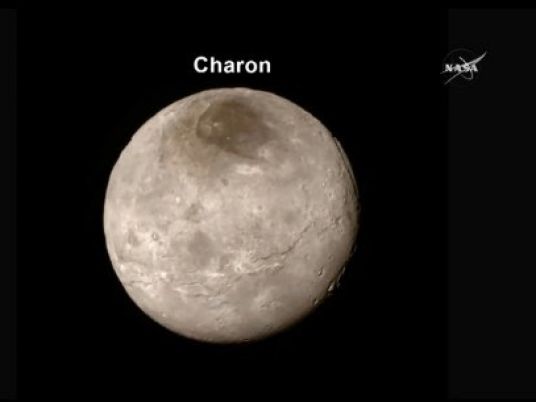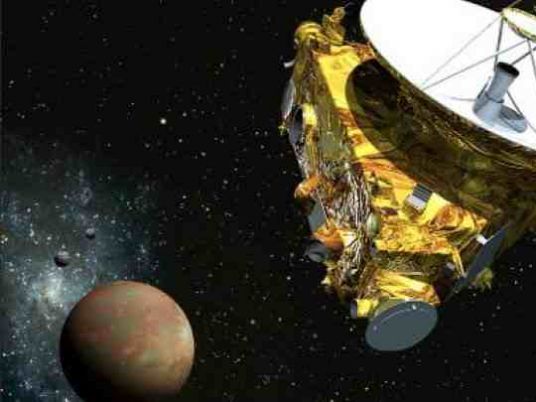On Wednesday, the world celebrated the success of the New Horizons probe, that has reached a point very close to the dwarf planet Pluto. This scientific miracle was everyone's story of the day, except in Egypt and the Arab region, where all we know about Pluto is that he is the friend of Mickey Mouse, and where the ceiling of our scientific knowledge has stopped at the miraculous benefits of a Nigella sativa and camel urine.
The probe’s three-billion-mile journey took more than nine years. It began on January 19, 2006, at a speed of more than 59,000 kilometers per hour and a cost of US$700 million.
In addition to the scanners and monitors, the probe carried the ashes of Clyde Tombaugh, the astronomer who discovered Pluto, in a wonderful gesture that confirms the human aspect of the journey.
I will not talk about the pictures and data that the probe will send about Pluto and its moon Charon, describing their geological nature, which is apparently different from what scientists used to think it was like.
I will talk about Arabs and Muslims, and how we insist on finding scientific miracles in the Quran. I will compare between this scientific fulfillment and our scientific unfulfillment.
In a meeting of the International Astronomical Union in Prague in August 2006, 2,500 scientists led by Professor Owen Gingerich concluded that Pluto, which was discovered in 1930 with astronomical calculations and without a telescope, should not be considered a planet because it does not meet the following five criteria that would define it.
1 – Planets have a diameter which is larger than Pluto's 2,306 kilometers.
2 – They have a minimum degree of gravity.
3 – They reflect sunlight and are not self-radiating.
4 – They have fixed orbits around the Sun and not any other celestial body.
5 – The gravity center of a planet and its moon is under the planet's crust, with a minimum density compared to the heavy density of the Earth.
The scientists discovered that the celestial body Xena is larger than Pluto, which means certain bodies that were thought to be planets may well be replaced by other bodies that meet the criteria.
This must have been shocking news to us and to our famous preacher Zaghloul al-Naggar, who used to explain to us the miraculous scientific aspects of the Quran in his weekly articles in Al-Ahram.
In one of his articles, Naggar talked about the verse in Surah Yusuf that reads: “I saw one of eleven stars and the Sun and the Moon prostrating themselves before me,” which he claimed to be a scientific fact that was discovered only in 2003.
He then fabricated the number of planets in order to arrive at the total number of 11, saying that the number of planets was six in 1781, namely Mercury, Venus, Earth, Mars, Jupiter and Saturn. Then Uranus was discovered, bringing the total number to seven. Then the asteroid belt was discovered in 1801 between Mars and Jupiter, which was the result of a planet exploding in this place, bringing the total number to eight. And then in 1846 Neptune was discovered, followed by Pluto and Sedna, bringing the total number to 11 in 2003.
This is how Naggar counted the number of planets, so as to contrive the business of Quranic miracles. And in order to rule out any possibility of discovering a twelfth planet, he said it would have to be 90 astronomical units away from the Sun, in which case it would not be affected by the Sun’s gravity and thus should not be considered a planet.
Naturally, the discovery of the 2,500 scientists in Prague turns Naggar’s talk into nonsense, because planets have been and will continue to be added to the Solar System, whether Naggar likes it or not.
This is the predicament that Naggar and others put us in, when they made a connection between the absolute religion, which knows answers, and science, which raises questions. Religion belongs to the realm of certainty, while science belongs to the realm of doubt. And there is no need to mix both of them, since this brings us to the trap of questioning religion.
The Quran is a book of guidance, not a book of biology, geology and astronomy. Its miraculous side lies is in its revolutionary ideas, which will prevail, and not in scientific theories that will change.
We defend the holiness of religion, but we also defend the liberation of science.
Please read this article again to find out how they have reached the top of the sky, and how we are still at the bottom of the Earth. It is all in the way of thinking.
Edited translation from Al-Masry Al-Youm


